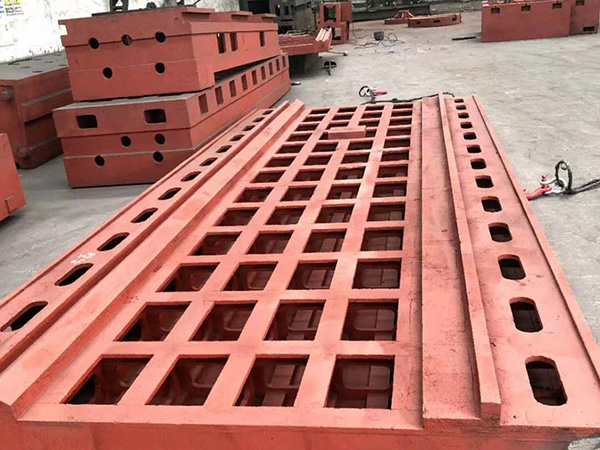- Navigation -
NEWS DETAILS
NEWS INFORMATION
A Complete Breakdown of the Machine Tool Castings Manufacturing
AUTHOR:Bozhong Tool DATE:2025-10-02 19:55:09 HITS:185
For anyone involved in industrial equipment, knowing A Complete Breakdown of the Machine Tool Castings Manufacturing Process is critical. Casting provides the strength, accuracy, and durability that modern machinery depends on. By exploring each stage in this production chain, you’ll see how quality castings are created, why they matter, and how bulk supply from trusted China manufacturers ensures efficiency and reliability.


Why Machine Tool Castings Matter
Machine tool castings form the backbone of many machines, and their benefits include:
·Withstanding high mechanical stress
·Dampening vibration for smoother operation
·Supporting long-term precision and functionality
Without high-quality castings, machine tools would fail to deliver consistent performance in demanding production environments.
Stage 1: Raw Material Choice
The process starts with careful selection of alloys. Gray iron, ductile iron, and specialty steels are commonly used depending on strength and performance requirements.
When sourcing from a China supplier, material certification is key. A verified China manufacturer with bulk supply capacity can provide documentation to guarantee consistent quality.
Stage 2: Pattern Creation
Patterns are physical models that define the shape of the casting. They are made from metal, wood, or plastic depending on the accuracy required.
Important considerations:
·Shrinkage allowances during cooling
·Machining allowances for final processing
·Digital modeling to improve precision
Stage 3: Mold Preparation
Molds are shaped around the pattern using sand, resin, or metal. The mold cavity replicates the intended casting geometry.
Steps include:
·Packing sand around the pattern
·Adding channels (gates and risers) for molten metal flow
·Ensuring proper venting for gas release
Stage 4: Melting and Pouring
Selected alloys are melted in furnaces and then poured into the mold.
Key aspects:
·Maintaining proper temperature for fluidity
·Preventing contamination during melting
·Controlling pour speed to avoid voids or defects
Stage 5: Cooling Phase
As molten metal cools, it transforms into the solid shape of the casting. The cooling rate directly influences grain structure, which impacts toughness and durability.
Stage 6: Shakeout and Cleaning
Once cooled, the mold is broken apart in a step known as shakeout. The raw casting is then cleaned to remove sand, scale, and excess material.
Common methods:
·Sand blasting or shot blasting
·Mechanical grinding
·Chemical cleaning where necessary


Stage 7: Heat Treatment
Heat treatment improves material properties such as hardness, ductility, and resistance to wear. Each alloy may require a different heat cycle depending on its composition and application.
Stage 8: Machining and Finishing
Castings are machined to achieve final specifications. Operations like drilling, milling, and surface finishing ensure parts fit seamlessly into assemblies.
Stage 9: Quality Control and Testing
Every casting undergoes inspection to ensure compliance with standards.
Checks include:
·Dimensional measurement
·Non-destructive testing (X-ray, ultrasound)
·Mechanical property verification
Stage 10: Packaging and Delivery
Final castings are carefully packaged to prevent damage during transit. For bulk orders, suppliers must demonstrate consistent results across all shipments.
Bulk Supply and Manufacturing Strength
Global industries often turn to China suppliers for large-volume casting needs. A genuine China manufacturer proves its production capacity through bulk supply records, offering stable quality and competitive pricing while ensuring customer trust.
Conclusion
Exploring A Complete Breakdown of the Machine Tool Castings Manufacturing Process helps you understand every step, from alloy selection to final inspection. Each stage contributes to producing reliable and precise components for machinery worldwide. For businesses seeking dependable bulk supply, sourcing directly from certified China manufacturers guarantees quality, efficiency, and value. By mastering this process, industries secure the foundation of high-performance machine tools.
References
GB/T 7714:Chen Y, Li S, Huang J, et al. Research on key casting process of high-grade CNC machine tool bed nodular cast iron[J]. Reviews on Advanced Materials Science, 2023, 62(1): 20230164.
MLA:Chen, Yang, et al. "Research on key casting process of high-grade CNC machine tool bed nodular cast iron." Reviews on Advanced Materials Science 62.1 (2023): 20230164.
APA:Chen, Y., Li, S., Huang, J., Hu, T., Li, X., Li, C., ... & Fan, H. (2023). Research on key casting process of high-grade CNC machine tool bed nodular cast iron. Reviews on Advanced Materials Science, 62(1), 20230164.
-
A Complete Breakdown of the Machine Tool Castings Manufacturing
-
A Step-by-Step Guide to Accurately Calibrating a Granite Platform
-
Typical Issues with Cast Iron Surface Plates and Their Solutions
-
How to Maintain Your Welding Table to Extend Its Lifespan
-
Which Materials Are Ideal for Top-Quality Machine Tool Castings?
-
Why Granite Platforms Are Indispensable for Precision Measurement?
Botou Bozhong Precision Machine Tool Co., Ltd.
Copyright © 2025-2026 https://www.bozhong-weldingtable.com. All Rights Reserved Botou Bozhong Precision Machine Tool Co., Ltd.Copyright





 Current Location:
Current Location:




